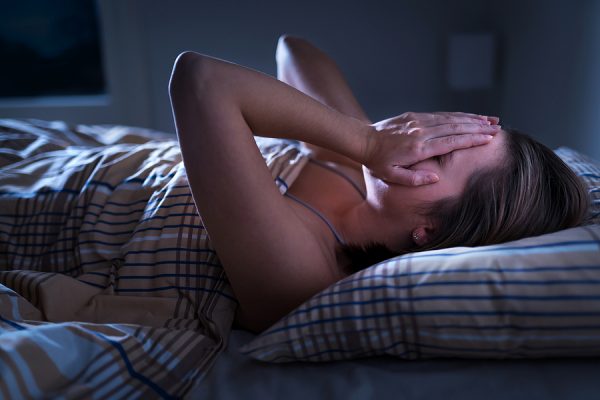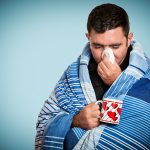One thing that drives me absolutely crazy is ambient light in my bedroom when I’m trying to sleep. I leave my phone in my office, cover up all of those blue, green and red lights from power strips and other equipment, and use black out shades on my windows. Otherwise, I can’t sleep at all.
There is a reason those lights affect my sleep. They may be affecting yours too, and you might not even be aware of it.
You see, in the absence of light, our brains produce melatonin, our main “sleep hormone.” But when we are exposed to light at nighttime – even low levels of it – melatonin production is halted.
This suppression of melatonin is enough to disrupt the body’s natural circadian rhythm.
You probably already know that the circadian rhythm is your body’s internal time clock. What you may not realize is that it works on a 24-hour schedule to regulate your blood pressure, heart rate, hormone levels and body temperature. It sets the pace for all of your body’s metabolic processes.
It is also what makes you feel more alert at certain times of the day, and tired at others.
But when the circadian rhythm is misaligned, all of these body functions are impacted. This explains why night shift workers are more prone to diabetes, heart disease, stroke, metabolic disorders and sleep problems. Night work is also associated with an increased risk of breast and prostate cancer.
Unfortunately, ambient light in the home can produce similar outcomes.
The Connection Between Artificial Light and Cancer
A September 2022 study published in the European Journal of Cancer found that artificial light at night is linked to both cancer and obesity.
An earlier study out of Spain linked nighttime exposure to artificial light to an increased risk of both breast and prostate cancer. This included exposure to indoor blue light, which is what the screens of our phones and tablets emit.
Plus, there are all of the other conditions linked to light at night, such as its negative effects on nighttime heart rate, metabolism and cardiovascular function.
Of course, all of this cycles back to the way light exposure at night affects our natural circadian rhythms. This is where it starts, and where you can stop it.
So what can you do to limit your exposure?
Sleep In Total Darkness
The key recommendation from several cancer specialists I know is to sleep in total darkness. I couldn’t agree more, and it’s really not that hard to do.
Use room-darkening blinds to block light from outdoor streetlamps and car headlights. You should close them an hour or two before bedtime.
Remove portable devices from the bedroom. You don’t need to sleep with your laptop, tablet or phone next to you. Move them to another room and charge them up overnight. (If you just can’t live without them, shove them into your bedstand drawer or cabinet while you sleep.)
Unplug the unpluggable. Some things have to remain stationary. So if you have your TV hooked up to a cable box, Roku or other devices, invest in a power strip. Plug them all into it and, at night when you shut everything down, turn the power strip off. You can do the same thing if you have a desktop computer and router set up in the bedroom due to space constraints.
Check into LED-dimming stickers. Yes! There are actually stickers designed specifically for dimming or blocking LED lights.
Invest in a sleep mask. You don’t have to go for a fancy, high end model. Even an inexpensive $6 sleep mask will do the trick.
Shut off the house lights before bedtime. Turn off any lights that may be adding to the ambient light in your bedroom. This includes hallway lights, closet lights, exhaust fan lights in the kitchen and all of the other lights in the house.
If you are used to having ambient light at night and find it difficult to accept the total darkness of your room, you can start off by using a small red night light. Red lights don’t interfere with melatonin production the way other light colors do. Then, once you get more comfortable with darkness, you can remove it.
Your body needs darkness just as much as it needs light.
SOURCES:
Jo H, Park HR, Choi SJ, Lee SY, Kim SJ, Joo EY. Effects of Organic Light-Emitting Diodes on Circadian Rhythm and Sleep. Psychiatry Investig. 2021 May;18(5):471-477.
Blume C, Garbazza C, Spitschan M. Effects of light on human circadian rhythms, sleep and mood. Somnologie (Berl). 2019 Sep;23(3):147-156.
Recent News about Night Shift Work and Cancer: What Does it Mean for Workers? Centers for Disease Control and Prevention. Last updated: April 8, 2022.
Muscogiuri G, Poggiogalle E, Barrea L, Tarsitano MG, Garifalos F, Liccardi A, Pugliese G, Savastano S, Colao A; Obesity Programs of nutrition, Education, Research and Assessment (OPERA) group. Exposure to artificial light at night: A common link for obesity and cancer? Eur J Cancer. 2022 Sep;173:263-275.
Garcia-Saenz A, Sánchez de Miguel A, Espinosa A, Valentin A, Aragonés N, Llorca J, Amiano P, Martín Sánchez V, Guevara M, Capelo R, Tardón A, et al. Evaluating the Association between Artificial Light-at-Night Exposure and Breast and Prostate Cancer Risk in Spain (MCC-Spain Study). Environ Health Perspect. 2018 Apr 23;126(4):047011.
Mason IC, Grimaldi D, Reid KJ, et al. Light exposure during sleep impairs cardiometabolic function. PNAS. (2022).
Cho Y, Ryu SH, Lee BR, Kim KH, Lee E, Choi J. Effects of artificial light at night on human health: A literature review of observational and experimental studies applied to exposure assessment. Chronobiol Int. 2015;32(9):1294-310.




